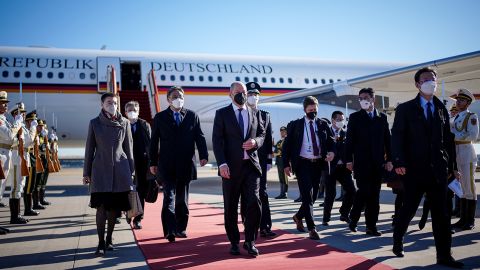Germany’s leader and top CEOs are visiting Beijing. They need China more than
Hong Kong/London
CNN Business
—
German Chancellor Olaf Scholz arrived in China on Friday with a team of top executives, sending a clear message: business with the world’s second largest economy must continue.
Scholz met with Chinese leader Xi Jinping at Beijing’s Great Hall of the People after landing in the capital Friday morning and was received by Premier Li Keqiang in the afternoon.
Joining Scholz for the whirl-wind one day visit is a delegation of 12 German industry titans, including the CEOs of Volkswagen
(VLKAF), Deutsche Bank
(DB), Siemens
(SIEGY) and chemicals giant BASF
(BASFY), according to a person familiar with the matter. They were expected to meet with Chinese companies behind closed doors.
The group entered China without participating in the usual seven-day hotel quarantine. Images showed hazmat-clad medical workers greeting Scholz’s jet at Beijing’s Capital International Airport to test the official delegation for Covid-19 upon their arrival.
During the Friday morning meeting between the two leaders, Xi called for Germany and China to work together amid a “complex and volatile” international situation, and said the visit would “enhance mutual understanding and trust, deepen pragmatic cooperation in various fields and plan for the next phase of Sino-German relations,” according to a readout from state broadcaster CCTV.

Scholz’s visit — the first by a G7 leader to China in roughly three years — comes as Germany slides towards recession. But it has fired up concerns that the economic interests of Europe’s biggest economy are still too closely tied to those of Beijing.
Since the invasion of Ukraine this year, Germany has been forced to ditch its long dependence on Russian energy. Now, some in Scholz’s coalition government are growing nervous about the country’s deepening ties with China. Beijing has declared its friendship with Russia has “no limits,” while China’s relations with the United States are deteriorating.
The tension was highlighted recently by a fierce debate over a bid by Chinese state shipping giant Cosco to buy a 35% stake in the operator of one of the four terminals at the port of Hamburg. Under pressure from some members of the government, the size of the investment was limited to 24.9%.
The potential deal has raised concerns in Germany that closer ties with China will leave critical infrastructure exposed to political pressure from Beijing, and disproportionately benefit Chinese companies.
But Germany is hardly in a position to rock the boat with Beijing as it grapples with the challenge of reviving its struggling economy. Its consumers and companies have borne the brunt of Europe’s energy crisis, and a deep recession is looming.
If the European Union and Germany were to decouple from China, it would lead to “large GDP losses” for the German economy, Lisandra Flach, director of the ifo Center for International Economics, told CNN Business.
The Kiel Institute for the World Economy estimates that a major reduction in trade between the European Union and China would shave 1% off of Germany’s GDP.
Germany needs to shore up its export markets as ties with Russia, once its main supplier of natural gas, continue to unravel.
When it comes to China, Germany won’t want to “lose also this market, this economic partner,” said Rafal Ulatowski, an assistant professor of political science and international studies at the University of Warsaw.
“They [will] try to keep these relations as long as it’s possible.”
As Western countries have imposed swingeing economic sanctions on Russia, China has publicly maintained its “neutrality” in the war while ramping up its trade with Moscow.
That has triggered a backlash in Europe, where some companies are already becoming wary of doing business in China because of its stringent “zero Covid” restrictions.
Pressure on Berlin is also mounting over China’s human rights record. In an open letter Wednesday, a coalition of 70 civil rights groups urged Scholz to “rethink” his trip to Beijing.
“The invitation of a German trade delegation to join your visit will be viewed as an indication that Germany is ready to deepen trade and economic links, at the cost of human rights and international law,” they wrote in the memo, published by the World Uyghur Congress. Based in Germany, the organization is run by Uyghurs raising awareness of allegations of genocide in China’s Xinjiang region.
Read More: Germany’s leader and top CEOs are visiting Beijing. They need China more than

